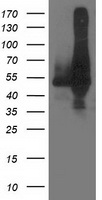 首页>
生物试剂
首页>
生物试剂
商家描述
产品评价(0)
商品介绍
gene_symbol:Neuropeptide Y
Synonyms:PYY4
clone_name:OTI8F8
immunogen:Full length human recombinant protein of human NPY (NP_000896) produced in E.coli.
predicted_size:8 kDa
background:This gene encodes a neuropeptide that is widely expressed in the central nervous system and influences many physiological processes, including cortical excitability, stress response, food intake, circadian rhythms, and cardiovascular function. The neuropeptide functions through G protein-coupled receptors to inhibit adenylyl cyclase, activate mitogen-activated protein kinase (MAPK), regulate intracellular calcium levels, and activate potassium channels. A polymorphism in this gene resulting in a change of leucine 7 to proline in the signal peptide is associated with elevated cholesterol levels, higher alcohol consumption, and may be a risk factor for various metabolic and cardiovascular diseases. [provided by RefSeq, Nov 2009]
buffer:PBS (pH 7.3) containing 1% BSA, 50% glycerol and 0.02% sodium azide.
purification:Purified from mouse ascites fluids or tissue culture supernatant by affinity chromatography (protein A/G)
isotype:IgG2a
host:Mouse
applications:WB
Recommend Dilution:WB 1:2000
reactivities:Human, Mouse, Rat
storage:Store at -20°C as received.
gene_symbol:Neuropeptide Y
Synonyms:PYY4
clone_name:OTI8F8
immunogen:Full length human recombinant protein of human NPY (NP_000896) produced in E.coli.
predicted_size:8 kDa
background:This gene encodes a neuropeptide that is widely expressed in the central nervous system and influences many physiological processes, including cortical excitability, stress response, food intake, circadian rhythms, and cardiovascular function. The neuropeptide functions through G protein-coupled receptors to inhibit adenylyl cyclase, activate mitogen-activated protein kinase (MAPK), regulate intracellular calcium levels, and activate potassium channels. A polymorphism in this gene resulting in a change of leucine 7 to proline in the signal peptide is associated with elevated cholesterol levels, higher alcohol consumption, and may be a risk factor for various metabolic and cardiovascular diseases. [provided by RefSeq, Nov 2009]
buffer:PBS (pH 7.3) containing 1% BSA, 50% glycerol and 0.02% sodium azide.
purification:Purified from mouse ascites fluids or tissue culture supernatant by affinity chromatography (protein A/G)
isotype:IgG2a
host:Mouse
applications:WB
Recommend Dilution:WB 1:2000
reactivities:Human, Mouse, Rat
storage:Store at -20°C as received.
 会员登录
会员登录.getTime()%>)
 购物车()
购物车()

 成功收藏产品
成功收藏产品